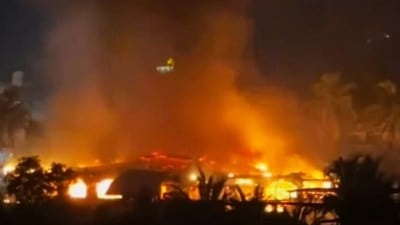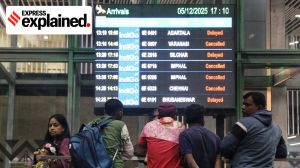Stay updated with the latest - Click here to follow us on Instagram
Protesters demand talks but Hong Kong says won’t bow
Students threaten to intensify stir with labour strike, more blockades.
 Protesters weather the storm on Hong Kong’s streets Tuesday. Source: Reuters
Protesters weather the storm on Hong Kong’s streets Tuesday. Source: Reuters
Pro-democracy protesters demanded that Hong Kong’s top leader meet with them on Tuesday and threatened wider actions if he did not, after he said China would not budge in its decision to limit voting reforms in the Asian financial hub.
Chief Executive Leung Chun-ying’s rejection of the student demands dashed hopes for a quick resolution of the five-day standoff that has blocked city streets, forcing some schools and offices to close.
It drew a defiant response from the students.
Alex Chow, secretary general of Hong Kong Federation of Students and organizer of the university class boycotts that led to the street protests, said the students were considering various options, including widening the protests, pushing for a labour strike and possibly occupying a government building.
Leung’s blunt rejection of the demands from the students, who are pushing for him to step down, comes as no surprise. The Chinese Communist leadership is wary of conciliatory moves that might embolden dissidents and separatists on the mainland.
Hong Kong police continued a light-handed approach to the protests, having shifted tactics Monday after their use of tear gas and pepper spray over the weekend failed to drive out tens of thousands of people occupying streets near the government headquarters. The sit-ins instead spread to the financial district and other areas.
“We are not afraid of riot police, we are not afraid of tear gas, we are not afraid of pepper spray. We will not leave until Leung Chun-ying resigns. We will not give up, we will persevere until the end,” Lester Shum, another student leader, shouted to a swelling crowd at Admiralty, near Hong Kong’s waterfront.
The protesters want a reversal of a decision by China in August that a pro-Beijing panel will screen all candidates in the territory’s first direct elections, in 2017 — a move they view as reneging on a promise that the chief executive will be chosen through “universal suffrage”.
Academics get death threats
Some academics, including Joseph Cheng (pictured), at the forefront of Hong Kong’s fight for democracy say they have got death threats or other intimidation. Cheng, a political science professor at City of Hong Kong University, said his computer was hacked, his access to databases and relationships with mainland academics has deteriorated and he has struggled to obtain research funding. Pro-Beijing groups had stormed his lectures, urged the city’s anti-graft agency to investigate him and harassed him outside his home, he said, adding that his wife had also been followed. None of the academics in Hong Kong has lost their jobs, suggesting that academic freedom, in its strictest sense, remains intact.
Pro-Beijing groups had stormed his lectures, urged the city’s anti-graft agency to investigate him and harassed him outside his home, he said, adding that his wife had also been followed. None of the academics in Hong Kong has lost their jobs, suggesting that academic freedom, in its strictest sense, remains intact.
- 01
- 02
- 03
- 04
- 05































